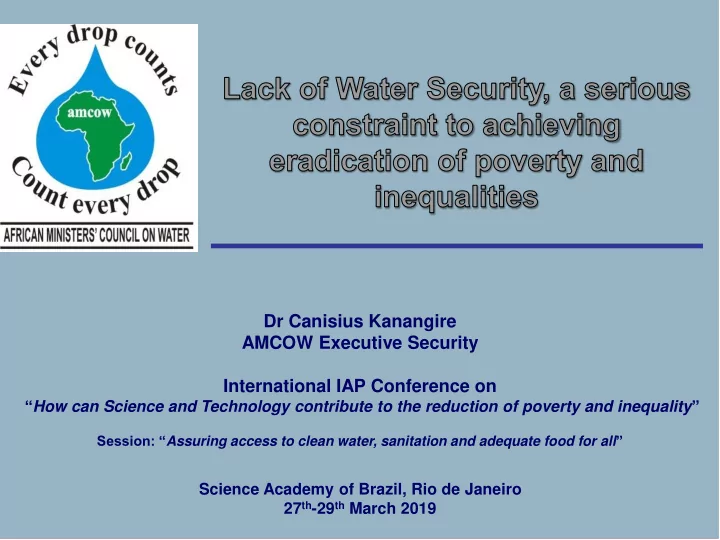

Dr Canisius Kanangire AMCOW Executive Security International IAP Conference on “ How can Science and Technology contribute to the reduction of poverty and inequality ” Session: “ Assuring access to clean water, sanitation and adequate food for all ” Science Academy of Brazil, Rio de Janeiro 27 th -29 th March 2019
Background • From time immemorial, people have settled near water, which has always been a source of life and well-being; • Access to water, food and sanitation is a precondition to life; and is declared human right • Water plays a crucial role in the socio-economic development of mankind • Water is vital, a cornerstone to achieving sustainable development, and the SDGs
Background “… water lies at the heart of everything that is important for human life: food, sanitation, energy, production of goods, transport and the biosphere; as such water ensures not only mere survival of humans, but also social well-being and economic growth. … Water cannot be substituted. ” Source: 2008 World Economic Forum
Access to water and sanitation services • Only 2% of global water is renewable freshwater • Natural distribution of water is highly variable geographically and seasonally • Water scarcity affects 40% of people globally • The patterns are worsening in many areas because of impacts of climate change • Poorest and less resilient communities are the most hit, hence exacerbating the inequalities • 663 million people lack access to safe water • 2.3 billion lack access to adequate sanitation • 795 million do not have enough food, 688.5M affected by severe food insecurity
Access to water and sanitation services • Africa is the second driest continent • Only 9% of freshwater for 15% of the world’s pop. • About 66% of Africa is arid or semi arid • 300/800M in SSA live with <1,000m3/capita/year) • Only 5% of water resources are exploited • <5% of cultivated land is irrigated • Key water withdrawal uses: Agriculture 86%, domestic 10%, industry 4% • Water equity, transboundary water sharing, degradation of water quality pose major challenges • Uncertainty and planning difficulty due to CC affect water availability
Access to water and sanitation services 339M have no access to basic drinking water 473M have no access to basic sanitation 333.2M affected by severe food insecurity Principal causes of hunger in Africa: • Poverty • Conflict • Environment challenges • Governance • Population growth
Access to water and sanitation services • Low public sector investment for water security, sanitation and food production • Huge infrastructure gap (for water storage, irrigation, energy, domestic use, ecosystems, etc). • Inappropriate governance and weak legal and institutional arrangements in managing national and transboundary water basins • 130-170bn required per year to bridge the gap! • New forms of financing • Stronger enabling environment • Technical capacity and innovations • Stronger political will • Strategic partnerships
Challenges Food/ Climate Water Energy • • Only 5% of agricultural • Rising Scarcity of Rainfall variability land irrigated fresh water due to climate • Low productivity (crops change (impediment • Disruption of including GM, irrigation, to hydropower, groundwater fertilisation, marketing and Irrigation, water and value chain, governance, discharge ICT) sanitation services) • Issues of pollution, • Africa with lowest power • Water related wastewater and generation disasters (floods, water quality • High hydropower droughts, potentials but hugely under developed (3% of Africa’s contaminations) renewable water exploited • Increased conflicts for power) Infrastr rastructu ucture
Water and socio-economic development • Unreliable access to water is one of major causes of poverty in Africa Ensure water security for all and for all usages Invest in multipurpose infrastructure Implement nexus approaches Improve planning with comprehensive scenario dvlpt Adopt technology and innovations Act now!!!
AMCOW and AMCOW’s role The African Ministers' Council on Water (AMCOW) • Specialised Technical sub-committee on water and sanitation issues for the African Union • Brings together all African Ministers responsible for water • AMCOW Secretariat established in Abuja, Nigeria since 2008 Mission To provide political leadership, policy direction and advocacy in the provision, use and management of water resources for sustainable social and economic development and maintenance of African ecosystems.
AMCOW FLAGSHIP PROGRAMS AND INITIATIVES • Pan-African Water and Sanitation Sector Monitoring and Reporting Kigali Action Plan 2M4M initiative Water Resource Priority Action Plan • Africa Water Week (AWW8 16-20 Nov 2020, Windhoek, Namibia) • Africa Sanitation Conference (AfricaSan6 22-26 Nov 2021) • African Water Facility (AWF) (a trust fund hosted by AfDB) • Rural Water Supply and Sanitation (RWSSI) (also hosted by AfDB) • African Network of Basin Organisation (ANBO) (hosted by OMVS) • African Groundwater Program (starting at the AMCOW Secretariat) • Pan-African Water and Sanitation Knowledge and Information Hub (starting at the AMCOW Secretariat) • African Sanitation Policy Guidelines (under development) • AMCOW Strategy 2018-2030 available!
Key Focus Areas • Strong enabling environment (policy, strategies and plans aligned to SDGs and other high level commitments) • Capacity Building including (peer-to-peer learning) • African Think Tank to influence high level decision making • Evidence-based policy and decision making • Strong political will (Summit of HoSG) • Strong coordination and synergies • Strategic Partnerships • Resource Mobilisation (Adequate and Sustained Investment)
Water and socio-economic development • Globally water is one leading drivers of economic development • Increasing demands from growing population, rapidly developing economy, effects of climate change, … put pressure on water resources • unpredictable supply of water could (will) constrain socio-economic progress in the future • Therefore: Business as usual will not work Mindset change required Knowledge, Technology and innovations to accelerate changes Invest today Cooperate effectively Act now • … . If we are to overcome poverty, inequalities and build resilient societies and economies
Water and socio-economic development
Thank You For your kind attention!
Recommend
More recommend